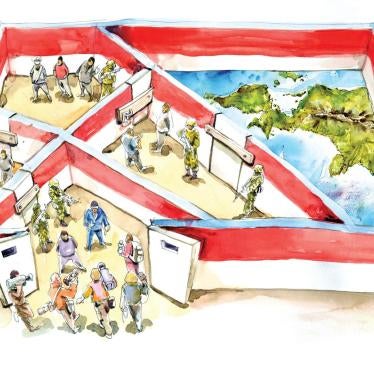As Indonesia’s president, Joko “Jokowi” Widodo, touches down in Australia for the first time since assuming the presidency, will human rights feature at all in the talks? Indonesian officials are already working overtime to control the agenda, with the defence minister, Ryamizard Ryacudu, warning Australia against “interfering in the West Papua issue” and asking Australia to send a message to Pacific Island nations that support autonomy for Papuans.
Ryamizard told an Australian journalist, with no apparent irony: “Those countries better keep their mouths shut and mind their own business. It is better that Australia speaks to them gently. If it was left up to me, I would twist their ears.”
Although Australia has consistently supported Indonesian sovereignty over Papua, the issue remains one of various sensitivities in the Australia–Indonesia relationship. But that discomfort does not give Indonesia a free pass to commit human rights abuses in the province, nor should Australia shy away from discussing such matters at the highest levels.
The provinces of Papua and West Papua are a remote, isolated region, where the OPM (Free Papua Movement) has led a low-level insurgency for decades. That insurgency has long been the excuse for significant military involvement in Papua. With the heightened police and military presence, there have been reports of security force abuses including killings, torture, excessive or unnecessary use of force, and mistreatment of peaceful protesters.
At least 37 Papuans remain behind bars for peaceful acts of free expression or expressing solidarity with the independence movement. All of this impunity is aided by reduced scrutiny of abuses as foreign journalists and human rights organisations face a half century-long restriction on visiting the province.
Perhaps Indonesia feels especially confident in rallying Australian support, since it scored something of a coup in August with the Papua visit by the attorney general, George Brandis. He was the first Australian cabinet minister to visit Papua, and human rights were glaringly absent from all public statements he made about that visit. His choice of travelling companion was also troubling – he was accompanied by Wiranto, Indonesia’s poster child for impunity for serious abuses.
Wiranto, the co-ordinating minister for political, legal and security affairs, was Indonesia’s armed forces chief in 1999 when the military and government-backed militias carried out atrocities against the East Timorese after they voted for independence.
In fact, given that background, it’s even more important for the prime minister, Malcolm Turnbull, and foreign minister, Julie Bishop, to ask some hard questions about what Indonesia is doing to address human rights violations in Papua and how Australia can help.
Australian acceptance of Indonesian sovereignty over Papua does not mean discussion of human rights concerns in Papua should be taken off the table. Let’s remember that Jokowi himself has previously called for greater respect for human rights in Papua and for the Indonesian government to stop blocking foreign journalists and observers from visiting Papua.
Here’s one suggestion that Turnbull could broach with Jokowi: if Indonesian officials are so keen to gain Australia’s support on Papua, then why not allow a multi-party parliamentary delegation from Australia, accompanied by journalists, free access to visit the province?
Australia’s parliament has long had an interest in the region, with a Parliamentary Friends of West Papua group co-chaired by Jane Prentice MP and Senator Richard Di Natale. Such a visit, not a junket, should include a range of Australian politicians armed with expertise in trade, tourism, economic and social portfolios and include meetings with Papuan leaders, civil society, imprisoned activists and ordinary Papuans.
In fact, when General Luhut Pandjaitan, then coordinating minister for political, legal and security affairs, visited Canberra in June he extended an invitation to the Australian government to visit Papua, saying,
I ask also any member of the cabinet to join us to go there. We have nothing to hide. It is not the time to hide something. Let us work together to make it transparent. If you want to criticise Indonesia we are happy to receive that criticism. But please, give that criticism based on data, not rumour.
A visit would help Australian politicians understand more about a region only a few hundred kilometres to our north that remains isolated and undeveloped. It would enable Australians to hear directly from Papuans about the issues affecting their lives – surely this is part of what Jokowi wants in trying to win the hearts and minds of Papuans.
Elaine Pearson is the Australia director at Human Rights Watch.








